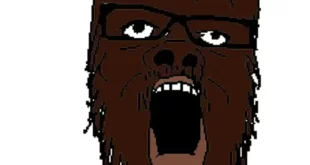Diversity Macht Frei
July 13, 2016
The poet John Betjeman earned popular acclaim and elite disdain by committing the cardinal crime of writing poetry that rhymed and made sense. In the documentary Metroland (shown below), he celebrated the minor rituals of Englishness, still preserved in the suburbs even as the inner cities fell to the immigrant hordes.
Now negro Hugh Muir celebrates the fact that brown people are assaulting the occupying the last redoubts of Englishness.
In post-referendum Britain we have seen sudden waves of intolerance. Eastern Europeans told to go home. A BBC reporter branded a “Paki” in the English town where she was born. An African-American on a bus told by fellow passengers to go back to Africa. This is distressing. But underneath, there is something more encouraging; the quiet riptide of communities adapting to significant, structural change.
John Betjeman would have spotted it immediately, for it is via the former poet laureate and his celebrated 1973 BBC documentary Metroland that the traditional perception of the English suburbs has been formed. On a gentle jaunt, in his gentle way, he described communities stretching from Neasden in north-west London all the way to the Chiltern Hills, along the path of the Metropolitan underground line. Betjeman’s suburbia spoke of cricket pitches, golf clubs, women’s institutes and verdant farmland: a new life for indigenous Britons at arm’s length from the bustle and smoke of London.
But that journey retraced, as I have been doing for a BBC radio documentary, reveals a very different Metroland. “Funereal from Harrow draws the train,” wrote Betjeman. “On, on northwestwards, London far away.” Harrow then, according to the 1971 census, had an Asian population of about 8,000 from a total population of 200,000. A further 1,500 settled there after Idi Amin’s mass expulsions from Uganda in 1972. Today, 31% of the residents there describe themselves as white-British; 69% are ethnic minorities. Betjeman’s Pinner, where he saw “sepia views of leafy lanes”, is much changed too. In 1971 there were fewer than 1,000 visible minorities. Pinner’s population of 19,000 is now 38% ethnic minority.
Were Betjeman able to take other routes from other cities into other suburbs, he would encounter the same phenomenon. Analysis by thinktank Demos suggests that just 800 from 8,850 council wards in England and Wales now have a 98% white population.
…
White Britons are expected to account for 70% of the UK’s population by 2061, with the ethnic minority population 30%.
…
One can’t be Pollyannaish about this, as alongside black flight, demographers detect an extension of white flight. Minorities move out; many white Britons move out even further. But perhaps there is a natural filtering system at play, and perhaps that’s for the best. Those who can be comfortable with a changing Britain embrace it or make the best of it. Those who can’t just pack up and leave.
 Daily Stormer The Most Censored Publication in History
Daily Stormer The Most Censored Publication in History


